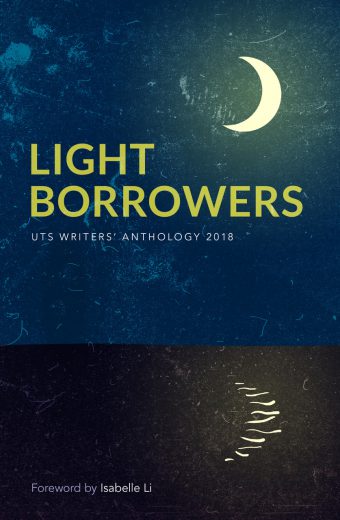The following is the foreword of the forthcoming 2018 UTS Writers’ Anthology, Light Borrowers, written by Isabelle Li.
This year’s anthology includes prose, fiction, poetry and screenplays from talented emerging writers including Christine Afoa, Ruth Armstrong, Sara Borman, Sally Breen, Alex Bulahoff, Shana Chandra, Daniel Comensoli, Olivia Costa, Daniel Date, Mark Gerts, Shoshana Gottlieb, Echo He, Sydney Khoo, ZA Knowles, Sam McAlpine, Helen Meany, David Naylor, Joseph Schwarzkopf, Amy Shapiro, Jack Cameron Stanton, EM Tasker and Tanya Vavilova.
The foreword is reprinted here with permissions of the author and publisher. Light Borrowers will be available soon from Brio Books.

If we liken the experience of reading to that of a journey, reading an anthology of twenty-five authors must equate to taking a trip into the unknown on a one-way ticket. The diverse forms and individual styles are daring to the mind, and the ever-changing contexts and altering perspectives are thrilling to the soul. I had planned to read this year’s UTS Writers’ Anthology in small doses, but I must admit I was so enthralled that I binged.
Light Borrowers contains twenty-eight compelling pieces, each a unique window to a world illuminated, and collectively a mosaic of the contemporary zeitgeist. The voices range from seductive, thoughtful, tourgent, authoritative, all commanding attention and deep engagement. Instead of relying on the drama of the subject matters, the writers often adopt an episodic approach to capture flashes of epiphany, incidents of silent power, encounters rich with meaning and possibilities. When I came upon Shoshana Gottlieb’s moving poem: ‘The In Between, / pockets of time that happen as we wait for / the moments we beg to define us’, I thought I had found the key to the anthology’s tension and resolve.
One theme that features strongly is grief. In Gottlieb’s other poem ‘ten/nineteen’, grief has contracted a child’s world so much that she wishes to be back in the past when she’s even younger. ‘i am ten years old / and i spend an hour ringing his mobile number / over and over and over / just to hear his voice once more // i am sick of being ten years old / i wish i were nine again.’ Christine Afoa’s poignant poem ‘My People’ speaks of a different sorrow, of ‘An existence, a millennia / Quantified, disqualified and trivialised’, of ‘the songs in a tongue / Now long-forgotten’. In Ruth Armstrong’s ‘Following Pilot’, a mother and her two boys go on a long trek in Nepal, each in their own way dealing with the pain of the father’s suicide. Their hearts break open as they try to save a dying dog.
Hovering in the twilight zone of complex relationships and existential angst, some characters struggle to name their wounded feelings. Sam McAlpine’s ‘Behind the Glass’ is a quiet story that tells of a mother’s devastation at night, worrying for her teenage daughter: ‘The idea that she has to learn things terrifies me.’ In Shana Chandra’s ‘The X.’, a Fijian Indian woman, who is ‘so comfortable wearing (her) difference in New Zealand and Australia’, is doubly dislocated travelling for the first time in her ancestors’ land.
Fiction in this anthology is not a mere mirror of facts, but a rebellion against reality. Alexandra Bulahoff ’s ‘The Stems of Red Maddening Apples’ is a fairy tale exquisitely retold. In the magical world of the Piper and his consort, Harkim and Greta are among the forest children, destined to be planted into the orchard of bones. In Sydney Khoo’s quirky, surreal- ist story ‘Collecting Stormwater for the Withering Drought’, kinship flourishes within the intimate space of an enchanted café, between hearts of fluidity and grace.
The issues of drugs and addiction are portrayed without stereotyping or moralising. In Nicole Lenoir-Jourdan’s hilarious ‘Baked Beans and Apple Pie’, the intoxicated young friends attend church in search of food, only to have their cat killed by their devout co-worker nicknamed Jesus. In Jack Cameron Stanton’s darkly comic ‘FunCity’, a dejected drug dealer contemplates suicide, but is soon caught up in the whirlwind of the last deal of his life, as he tracks down his lost love.
This collection is a collector’s item as it contains many stylistically weird and wonderful treasures. In Catherine Mah’s ‘The Power of Snails’, the narrator, with lyrical diction, in visceral detail, tells the terror of a hundred snails caught in a dark crater. In Sally Breen’s evocative ‘Garden’, weeds become metaphors for memories, and the grandfather’s garden, with generations of the past buried deep, ‘curls around secrets and lies’.
As a writer from China, I’m particularly touched by Echo He’s ‘Writers in My Family’, a love song on reading and writing. In this meandering piece, the narrator recounts her first stroke of genius at the age of five, the long hiatus while she is busy surviving, her belated blooming in her fifties, and the bittersweet discovery of other writers in her family.
The UTS Writers’ Anthology is now in its thirty-second year, showcasing new masters in the making. I would have loved to single out every piece of these finely crafted and highly accomplished works, but could only highlight a sample for the prospective reader. I congratulate the writers on this gratifying book, and wish them all the very best in their literary journeys. I hope readers will take the plunge and read this excellent collection, and that the truly curious and adventurous will make the UTS Writers’ Anthology their annual pilgrimage.

